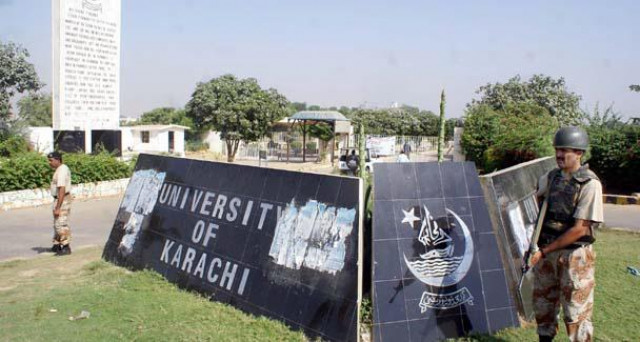Public universities will now be controlled by the chief minister
Controversial law wrests authority from governor, syndicates , may change rules to 'benefit' people of Sindh

Despite continued protests by opposition parties, the Sindh government passed on Friday a law to transfer control of public universities and degree-awarding institutions from the governor to the chief minister.
Amending the Sindh Universities and Institutes Law (Amendment) Bill 2018, the government has now given the powers of appointing vice-chancellors, pro-chancellors, pro-vice-chancellors and finance directors to the chief minister. During convocations, the governor will distribute degrees to graduates. As per the law, the admission policy of public universities will now be determined by the Sindh government, which may be changed to provide equal opportunities to people living in Sindh.
When the bill was moved by Parliamentary Minister Nisar Khuhro, opposition members resisted the move and called it 'yet another blot in the face of democracy'. "Today, the Pakistan Peoples Party government has attempted to snatch powers from public universities. The Sindh government can't run its own departments. How will it manage to control all public universities in the province?" questioned Muttahida Qaumi Movement (MQM) deputy parliamentary leader Faisal Subzwari while speaking to the media. "We, along with teachers, will launch a campaign against the decision and challenge this law in court."
Referring to the new admission policy, he said, "As per this law, the provincial government will now finalise the education policy of the university, which is not acceptable to us".
Members of other opposition parties - the Pakistan Tehreek-e-Insaf (PTI), Pakistan Muslim League - Nawaz (PML-N) and PML-Functional (PML-F) - tore up the agenda copies to protest the decision to pass the law.
According to the law, the universities' syndicate will comprise of 19 members. The VC will be chairperson of the syndicate while the pro-vice-chancellor, one member from the provincial assembly to be nominated by the Sindh Assembly speaker, two senators elected by the Senate chairperson, a judge of the Sindh High Court nominated by the chief justice, the finance secretary, university and boards secretary, the chairperson of the Higher Education Commission (HEC) or his nominee and chairperson of the planning and development board will be members. Other members will include a dean to be nominated by the government on the recommendation of the VC of the respective university, one professor to be elected by professors of the university, one assistant professor, lecturer, three persons of eminence to be nominated by the chief minister in consultation with the VC and one principal of an affiliated college.
Earlier, the education minister was the pro-chancellor of all public universities but after the amendment the chief minister will have the authority to nominate any minister as pro-chancellor of any public university.
Bill to regularise teachers to be presented in Sindh Assembly today
According to the new law, the governor cannot chair any meetings and all his previous powers are instead conferred upon the chief minister. "Before the 18th Amendment, legislation in respect to the HEC rested with federation, which was being regularised by the commission itself," read the bill. "However, after the 18th Amendment, the concurrent list was abolished and the Sindh HEC was established. Consequently, all powers came under the domain of the provincial government," it added. "The office of the governor, who is the chancellor of public universities, is only statutory. Since the appointment of the chancellor is statutory, the function and power will be controlled by the stature."
The law went on to state that its purpose was to maintain uniformity in the organisation, management and control of public universities and degree-awarding institutions in the province. It stated that it aimed to provide more appropriate and effective roles to the elected provincial government.
According to the law, the admission policy will be finalised by the academic council of the respective university but will be done in the light of Sindh government's policy.
The law further said that the office of the chief minister will have powers to conduct inspections of any university and remove any officer from service if he or she is found guilty in any form of fraud or crime. "The VCs of the public universities will go on leave with the approval of the chief minister," the law said. However, the syndicate of a public university will have the power to appoint the controller, registrar, works and services director, librarian and chief accountants.
Sindh CM calls for annual drug screening of school, university students
After the law was passed, MQM parliamentary leader Syed Sardar Ahmed told the media said that PPP has changed Zulfikar Ali Bhutto's law. "All teachers associations have already opposed this law so we can't accept it," he lamented.



















COMMENTS
Comments are moderated and generally will be posted if they are on-topic and not abusive.
For more information, please see our Comments FAQ